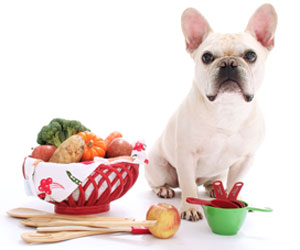9 Things You Need to Know About Your Senior Dog’s Diet Needs
Most dog owners eventually face the challenge of properly feeding a geriatric dog. About one-third of all dogs in the United States are 11 or older, and dogs have an average life span of about 14 years, says Kathleen Hefner, DVM, a specialist in nutrition and nutritional counseling at the Animal Hospital of Saddle River in N.J.

Hefner emphasizes, however, that each dog is unique, so owners should consult their veterinarians and rule out any health problems before making dietary changes. All senior dogs are not the same, she says. You have to look at the more subtle things. You’ll want guidance on your individual pet’s needs.
But the majority of aging dogs face some common physical changes that require dietary changes to address them:
Dogs’ appetites can decrease as they age, so if they eat less, a calorie-dense diet can ensure they still get enough nutrients.
Dogs might also eat less because of pain from periodontal disease; more palatable, easier-to-chew food helps ensure Fido doesn’t go hungry.
Phosphorous and sodium can aggravate kidney problems, heart disease, and hypertension. If your dog has these illnesses, look for a diet with less of these two elements.
A sufficient amount of zinc helps keep the skin, coat, and immune system healthy.
Antioxidants, such as vitamins A, C, and E, and beta-carotene, are all believed to fight cancer and slow aging, so owners may want to supplement these if their dogs’ food doesn’t already include sufficient amounts.
Additives for joint health, such as glucosamine and chondroitin, often ease the aches of arthritis by maintaining the healthy cartilage that cushions the bones. Many senior dog foods include these ingredients, also available as supplements.
Aging dogs tend to have more gastrointestinal distress, so a diet with increased fiber can help prevent constipation.
Older dogs still require protein – vital to the body for cell repair and muscle maintenance – but can’t metabolize it as efficiently. They need higher-quality protein with a complete range of essential amino acids.
The omega-3 fatty acids found in fish oil and flaxseed oil can help alleviate a dull, dry coat and dry skin, as well as aid immune-system function.
Cheese Pleaser Dog Treats Recipe

Whether you make all of your dog’s food or just want to give your dog a special culinary surprise, this cheesy Pooch Munchies recipe, from the Three Dog Bakery, is sure to have your dog begging for more.
Get the whole family involved for this quick and easy dog recipe.
Prep Time: 15 min
Bake Time: 12 min
Ingredients:
3 cups whole wheat flour
1 teaspoon garlic salt (do not use fresh garlic)
1/2 cup soft bacon fat
1 cup shredded cheese
1 egg, beaten slightly
1 cup milk
Baking Instructions:
Preheat oven to 400 ºF.
Place flour and garlic salt in a large bowl. Stir in bacon fat. Add cheese and egg.
Gradually add enough milk to form a dough.
Knead dough and roll out 1-inch thick.
Use a dog bone-shaped cookie cutter to cut out dough. (Don’t have a cookie cutter? Use an upside down glass to cut out round cookies)
Place dog bones on a greased cookie sheet and bake about 12 minutes or until they start to brown.
Cool and serve.
Homemade Dog Food for Elderly Dogs
Seniors’ Nutritional Needs
In general all dogs need the same basic essentials in their diets. Protein, fats and carbohydrates are all necessary to keep your dog healthy. You’ll need to do some adjusting for your geriatric pooch, though. As your dog ages his protein needs stay the same, but his metabolism slows down. That means he’ll need to get the same amount of protein but do it while taking in less calories. Increase the fiber, cut the carbs and use sources of lean protein like poultry, fish, lamb or extremely lean beef to accomplish this.
Supplements
To assure that your older dog is getting all of the vitamins and minerals he needs, you might consider adding some human grade bonemeal and a few drops of a vitamin supplement to the food you make for him. Omega-3’s are another supplement that you can add that will help keep your dog’s joints and heart healthy as well as keep his coat shiny and soft.
Talk To Your Vet
Once you have a plan and know what you want to put into your elderly dog’s homemade meals, talk to your vet to get advice on foods and nutrients that your dog might need based on his health. Certain medical issues like kidney disease, heart disease or diabetes may affect what ingredients you can use in your dog’s food and how much of it you can put in. Show your vet the recipe you intend to use and get his thoughts. He’ll also be the best person to ask about vitamin supplements. Just because your dog is older doesn’t mean that he has a vitamin deficiency. Instead of OD’ing your dog on vitamins, make sure your vet recommends adding them — or any supplement — to his meals.
Basic Senior Recipe
A basic dog food recipe that will be tasty and healthy for your senior citizen canine is easily made by crumbling 1 pound of ground turkey into a large pot containing six cups of water and one teaspoon of dried rosemary. Stir to distribute the turkey and rosemary evenly and bring it to a boil over high heat. Once the mixture boils, reduce the heat to low and allow it to simmer for 20 minutes. Add 8 ounces of frozen vegetables, like carrots, broccoli and cauliflower — thawed and cut into small pieces — and cook for five minutes more. Remove the pot from the heat and allow it to cool to room temperature before you feed it to your dog. Store the leftovers in the fridge in a covered container.





